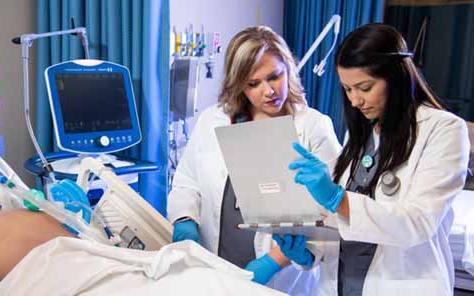What's Your Goal?

If your goal is to work in the fast-paced, challenging specialization of Respiratory Care as a licensed, Registered Respiratory Therapist, then completion of 中国澳门博彩官网's respiratory care Associate in Applied Science Degree is an excellent choice to achieve your career goal.
We Help You Get There With...
- 16 Clinical Affiliates within a six-county region
- State-of-the-art classroom and lab technologies
- Student scholarships, supported by the Berks County Tuberculosis Society
- Engaging student-centered classroom experiences
Program Description
The AAS program in Respiratory Care prepares graduates to work in hospitals, rehabilitation and skilled nursing facilities, patients' homes, and physician offices to assess and treat patients with breathing disorders. Respiratory Care students participate in diverse classroom, laboratory, and clinical experiences in the Berks, Chester, Lancaster, Lebanon and Lehigh counties. The laboratory portion prepares students for hands-on work in real-world patient care.
What You Will Learn
- Respiratory skills to provide treatment, assessment, diagnostic evaluation, and care to patients with cardiac (heart) and pulmonary (lung) disease processes
- Chronic, acute and critical care concepts across the lifespan
- Professionalism, leadership and communication
Career Outlook
Respiratory Care is one of the fastest growing healthcare occupations across the United States, offering various settings in which to practice along with specialty areas to choose from. View the Occupational Handbook for Respiratory Therapists.
Transfer Opportunities
- Alvernia University (Bachelor of Science in Healthcare Science) with all credits earned as part of the AAS in Respiratory Care transferring into Alvernia
- Boise State University Online Program: The 75-credit curriculum satisfies all professional level curricula (69 credits transfer)
- University of Cincinnati Online Program (70 credits transfer)
Clinical Affiliates
Excellent clinical practice rotations are the backbone of any Respiratory Care program. Clinical practice allows the student to use classroom learning in a "real life" setting. The 中国澳门博彩官网 Respiratory Care program utilizes a variety of institutions in Berks, Lancaster, Lehigh, and Montgomery counties. Students rotate through these hospitals in all terms to gain experience in all aspects of respiratory care. Clinical affiliates include:
- Good Shepherd Specialty Hospital, Rehabilitation Hospital and Pediatric LTACH
- Lehigh Valley Health Network (Cedar Crest campus)
- Lehigh Valley Health Network (Muhlenberg campus)
- Penn State Health : Milton S. Hershey Medical Center
- Penn State Health St. Joseph
- Tower Health Phoenixville Hospital
- Tower Health Reading Hospital
- St. Luke's University Health Network (Anderson campus)
- St. Luke's University Health Network (Allentown campus)
- St. Luke's University Health Network (Bethlehem campus)
- St. Luke's University Health Network (Geisinger)
- St. Luke's University Health Network (Miner’s campus)
- Tower Health Pottstown Hospital
- WellSpan Ephrata Community Hospital
- WellSpan Medical Equipment
- Wellspan Good Samaritan Lebanon
Admission Requirements
- Be a graduate of an approved secondary school or hold a high school equivalency diploma (GED).
- Complete and submit the 中国澳门博彩官网 Application for Admission.
- Follow Selective Admissions Process as noted in the current Student Catalog for the Respiratory Program.
- Respiratory Petition Instructions
- TEAS Information Booklet
- Respiratory Care Program Map (Check Sheet)
Want To Learn More?
- View the Respiratory Care curriculum in the catalog.
- Contact an enrollment specialist at admissions@mmmukg.com, 610.607.6224 or 800.626.1665.
- Stop by the Welcome Center in the Berks Hall lobby.
- View the estimated program costs for this program.
- Get financial aid help at financialaid@mmmukg.com or 610.607.6225.
- The Reading Area Community College Respiratory Care Program (#200387) is accredited by the Commission on Accreditation for Respiratory Care (CoARC) (www.coarc.com).
- CoARC accredits respiratory therapy education programs in the United States. To achieve this end, it utilizes an ‘outcomes based’ process. Programmatic outcomes are performance indicators that reflect the extent to which the educational goals of the program are achieved and by which program effectiveness is documented. Please refer to CoARC’s webpage for additional information: http://coarc.com/students/programmatic-outcomes-data/.
